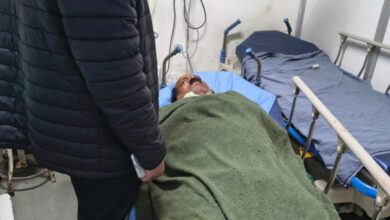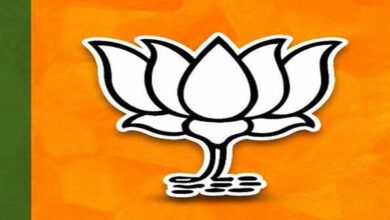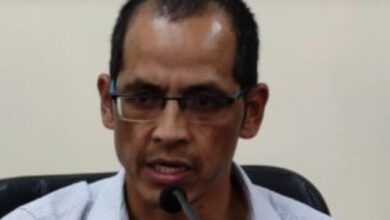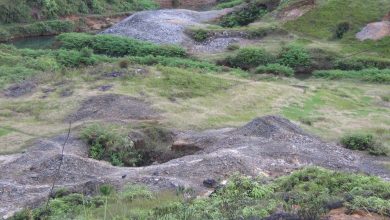Problems exist but voices don’t
Life's not easy in Mawryngkneng but voters are reluctant to speak about it

I don’t know anything,” a septuagenarian vegetable seller at Mawryngkneng market said with a wonted reluctance of a stranger when asked about the developmental deficiencies in the C&RD block in East Khasi Hills. Similar answers followed when a group of youngsters, two among them first-time voters, was targeted with the same question. The apathy of the hoi polloi to speak out was annoying but not surprising in the state, especially at a time when the election fervour is at its peak.
Mawryngkneng, around 34km from the city, is among the three Assembly constituencies which are going to bypolls on October 30 following the death of the respective sitting MLAs. This constituency on the way to Jowai was represented by Congress’s David Nongrum, who died of heart attack in February at the age of 42. This time, the party has fielded Highlander Kharmalki, a former civil engineer and resident of Mawryngkneng.
On October 23, a Saturday, the main market was abuzz with sellers and buyers. It was the day for weekly haat. A few yards away from the market was the local college building, the site of the Congress’s election campaign attended by the stars — Charles Pyngrope, Ampareen Lyngdoh, Mayralborn Syiem, Mawkhar-Pynthorumkhrah MDC PN Syiem and Congress MDC from Rambrai-Jyrngam Bajop Pyngrope, among others. The campaigners had chosen a perfect day for flagging their agenda and flagellating the opponent — the ruling NPP and its allies in the government.
The meeting started with a few listeners lining the roadside or sitting in nearby tea shops, casually lending an ear to the speakers. The market was not yet over and the potential electorate had important tasks at hand before they could attend the political meeting.
But as the day progressed, people started gathering, along the road, in front of shops and on top of buses. The enthusiasm was jarring when set against the reluctance of the locals to speak about their persisting problems.
A walk around the weekly market was a revelation — not about the ground reality but of the denial of its existence. The reality is what the men, or women, in power tom-tom about. The public chooses to remain voiceless.
At one end of the market was a 66-year-old vegetable vendor. She too was reluctant to speak but when assured that her name would not be revealed, she got back her voice. “There are problems, of course, and there always be problems for the poor like me. But I think the Congress has a strong foothold in the constituency. This time too, the Congress candidate will win,” said the vendor from Nongdawah village.
“So, are you voting for Highlander?”
A sheepish smile. No comment.
Farther inside the market was 24-year-old Amelia, selling local spices. The young vendor is a graduate and seldom comes to the weekly market to substitute her mother.
“Road connectivity remains a problem,” Amelia said when asked about her views on the development in the constituency. She too skirted many of the questions posed to her.
“Business is still tepid. The impact of the pandemic has not waned,” she added and focused on packing chilli flakes in small plastic pouches.
Congress MLA Ampareen Lyngdoh too raised the road connectivity problem, saying the roads in the interiors of the constituency are in pathetic condition. “Only those roads built during the tenure of Charles Pyngrope and David Nongrum are a saving grace. Most of the projects sanctioned by the government are yet to begin,” she added.
Later, Nongthymmai MLA Charles Pyngrope informed that tarmac (or tarmacadam) roads were built when he represented the constituency between 2008-13, pre-delimitation when the constituency was Sohryngkham.
Meanwhile, a huge applause could be heard from the campaign site. Something a leader had said resonated with the public. They continued to cheer.
A few meters away was a small, dark shop selling tea leaves and a few other regular items. There were no customers, only three senior citizens whiling away the hours. “We have a few questions,” the mediapersons covering the campaign said and were welcomed by the same reluctance.
Most of the reporters dispersed after a few seconds’ wait. A few lingered around in the hope that the electorate would speak. Hope always floats, and at times reaches the shore. Be it the frustrated reporters, the innocent and god-fearing electorate or the politicians seeking support, hope remains the only string of attachment.
T Lyngdoh, M Lawai and P Kharsohnoh decided to speak, choosing their words carefully. Lyngdoh spoke first. She said water crisis is acute and “I have to carry water from the faraway source”.
Taking a cue from Lyngdoh, Lawai and Kharsohnoh complained about erratic power supply. “There is barely any electricity. Power cuts are for hours. This not only hampers our work but our children’s education too,” the men said, almost in unison.
Electricity and water did not appear in the campaign speeches of the political leaders. Healthcare too was not on the list. But what was focused during the campaign had deeper economic implications.
Illegal toll gates in the constituency, and in many others, are a major setback for small-time traders and visitors from outside. “There are 10 of them between Mawryngkneng and Mawknu. There are many more in Umsning and other parts of Ri Bhoi. The gates have been set up in the garb of KHADC but the council does not have the power to set up toll gates. What is the government doing? What kind of message are we sending out to the outside world,” said former Mawryngkneng MLA Charles Pyngrope, father of late Nongrum, during a tête-à-tête with reporters.
MDC Bajop and Lyngdoh also spoke about the “problem” during their campaign speeches amid loud cheers.
But for a young trader in the market, road or electricity does not matter when livelihood is at stake. “The business is yet to pick up post pandemic. Fuel prices have added on to the pressure,” said the vendor, who is from the neighbourhood.
“Any help from the local leaders?”
A smile. An attempt to get busy.
The ride from Shillong to Mawryngkneng is smooth and the scenic views on both sides of the road are refreshing

after the city’s concrete canvas. The traffic congestion, however, can be a put-off. As Mawryngkneng approaches, one can see pylons distorting the skyline.
The market area was crowded on Saturday but none wore a mask. “After a long spell of economic distress, people have started earning and livelihood is their focus. So, they are not much bothered about masks,” was MDC Pyngrope’s reply when asked about locals’ awareness on the pandemic.
A senior citizen, after cajoling, said the health centres here are “as good as it gets in a rural area”.
There is a unit of the Integrated Child Development Services (ICDS) that covers about 50 villages and have sufficient medicines, said Raton Wahlang, a staff at the ICDS pharmacy
“I don’t know anything,” the reply came haunting when a woman, with a child tied on her back, was asked about the healthcare services in Mawryngkneng.
A middle-aged man standing nearby pleaded to be left alone. “I am not aware of anything,” he said, and added something in his defense.
The loudspeakers put up by the campaigning political party spewed promises, the sound of which drowned his voice. The music began and the dance too.
~ Team Sunday Monitor
Photos by MM





